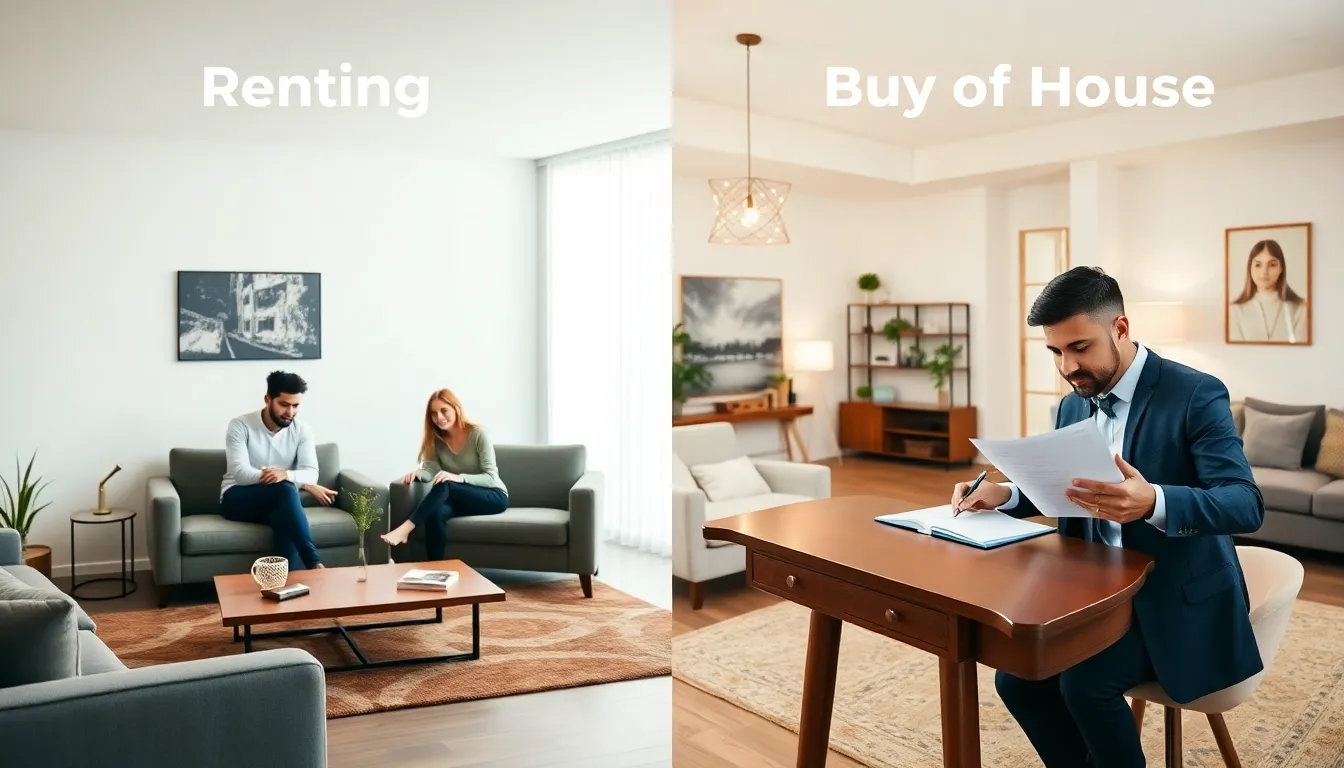Deciding between renting an apartment and buying a house is no small feat. It’s like choosing between a delicious slice of pizza and a fancy gourmet meal: both have their merits, but only one fits your current craving. In this text, we’ll dive deep into the layers of renting and buying, exploring the nitty-gritty details, pros and cons, and financial implications. Whether you’re a free-spirited wanderer who values flexibility, or a rooted planner dreaming of homeownership, there’s a way to find your right fit. Let’s get started.
Table of Contents
ToggleUnderstanding The Basics

When discussing renting an apartment versus buying a house, it’s vital to grasp the fundamental differences. Renting typically involves leasing a property from a landlord, usually on a one-year contract. This arrangement allows for mobility, as tenants can move easily at the end of their lease. On the flip side, purchasing a home is an investment. This option comes with the responsibility of paying a mortgage, property taxes, and maintenance costs. Owning a home also means having a tangible asset that can appreciate over time. Your choice may often depend on various factors, including financial stability, lifestyle, and long-term goals.
Pros and Cons of Renting
Renting an apartment certainly has its perks. First, it offers unparalleled flexibility: tenants can move more easily if jobs change or if they simply crave a new neighborhood. You’re also shielded from maintenance responsibilities, as landlords typically handle repairs. Also, renters can avoid property tax headaches and fluctuating housing markets.
But, renting does come with its own downsides. One glaring issue is the lack of equity building. Monthly rent payments don’t contribute to ownership: they simply fill someone else’s pocket. Plus, renters often face regulations from landlords about renovations and pets. There’s also the risk of rising rents, which can exponentially affect a tenant’s budget.
Pros and Cons of Buying
On the buying side, homeownership cultivates a sense of stability and belonging. Homeowners have the freedom to customize their space exactly to their liking, whether it’s painting walls or remodeling the kitchen. Also, mortgage payments contribute to equity, which can provide long-term financial security.
But, owning a home is not without its challenges. Maintenance costs can be staggering when something like a roof or air conditioning system suddenly needs repair. Also, the responsibility to pay property taxes can catch homeowners off guard. Finally, the commitment that comes with buying a house can be daunting, especially if a homeowner’s life circumstances change.
Financial Considerations
When evaluating renting versus buying, finances play a crucial role. Renters typically face lower upfront costs, often just requiring a deposit and the first month’s rent. On the other hand, buying a house presents substantial initial expenditures, including down payment, appraisal fees, and other closing costs.
Also, those looking to buy should consider ongoing costs like property taxes, homeowner’s insurance, and HOA fees. These expenses can significantly impact overall budget planning. It’s also important to factor in market trends. Sometimes, it can be more economical in the long run to buy rather than rent, especially in rapidly appreciating areas.
Lifestyle Factors to Consider
Lifestyle choices weigh heavily in the renting vs buying debate. Individuals valuing community engagement and a strong sense of home may lean toward buying. They often have ties to schools, workplaces, and friends in the neighborhood.
Conversely, those who see themselves as adventurers or those in transient careers may find renting incredibly appealing. The ability to relocate without the stress of selling a home can be a great relief. It eventually boils down to personal preferences and priorities. Are you more of a homebody or a nomad? This decision shapes your living experience and satisfaction.
Long-Term vs Short-Term Commitment
Duration of stay significantly influences the choice between renting and buying. Renting is often the safer bet for those unsure about their future plans. It provides a buffer, allowing one to reassess life goals without the pressure of a long-term mortgage.
Alternatively, for those who envision settling down for the long haul, buying can provide stability and investment benefits. Building roots in a community, especially when establishing a family, may drive individuals toward homeownership. Balancing your long-term goals with current realities is crucial in making this decision.


